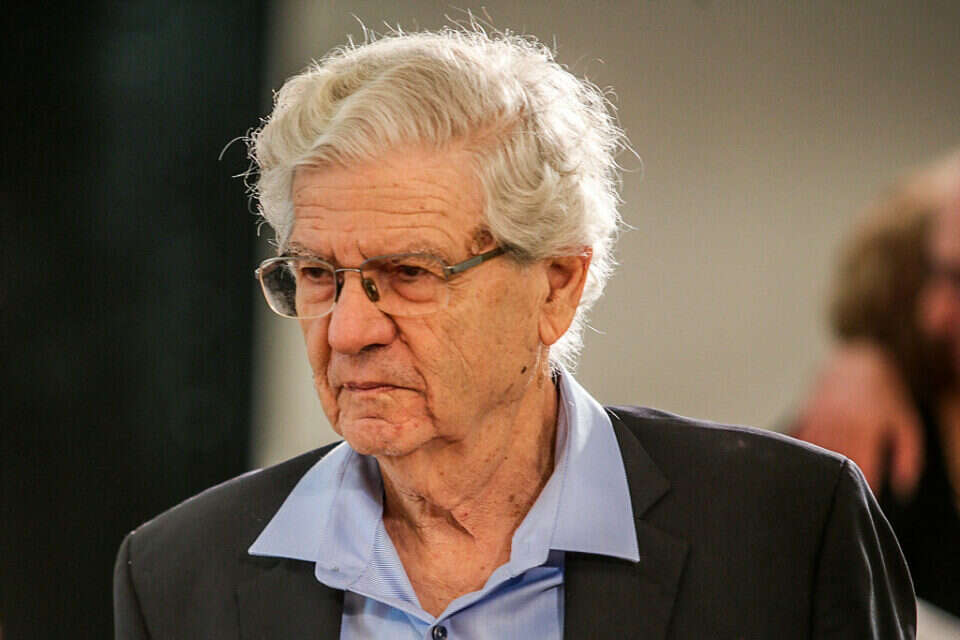1.
Justice Minister Yariv Levin's announcement about the amendment plan in the Israeli justice system, the day after the Tena Tevet fast, was a declaration of independence by a large camp in the nation.
For years, he watched with wide eyes how his democratic right to decide was severely curtailed, and given to an unelected group of judges, who, as much as we would like, cannot detach themselves from their worldview.
Thus, in fateful issues - which until recently were decided in democratic elections - they mixed in controversial value considerations as if they were fundamental axioms.
Seeing the actions of his hands about to drown in the sea, retired judge Aharon Barak was called to the fray.
"Poison beads" strangling the throat of Israeli democracy, described the sections of Levin's plan, and even called him a criminal(!), and wondered why he was not consulted earlier.
He also warned against civil war, and even volunteered to face a firing squad and die for the sanctification of Hashem (his own name...) Woe to the eyes that saw this.
In the first century BC, Abatalion, one of the greatest of the Tanaim, said: "Sages, be careful with your words, lest the duty of exile be imposed and evil waters be revealed to the place, and the disciples who follow you will drink and die, and there will be a desecrated heaven."
Because, if Aharon Barak expresses himself like this, what do we have to complain about Knesset members who want to stand out in the public cacophony, and therefore take their statements to extremes as if they have no people and society and country to manage?
2.
We understand very well, Judge Barak, what democracy is and what the role of the authorities in the country is, even if you believe that "with you, you will die wisely".
In the name of an interpretation of reality - one of several - that depends on a certain ideological and political concept, the freedom of the people to decide on their future has been taken away.
Barak treated the language of the law like the sages of the Mishnah and Talmud of their time: his interpretation overcame the will of the legislator, thus creating a new law.
He bequeathed this authority, which he invented out of thin air, to his successors, and thus the judiciary also became a legislative authority at will.
Sages referred to the biblical law only as a basis for discussion, within the framework of which their interpretation alone determined the binding halacha. Hebrew law is not learned directly from the Torah, but through the interpretive mediation of our sages. They were careful to do so, until they said that one does not learn halacha from the Mishnah, but only from the Talmud that interprets it, certainly not From the language of the biblical law as simple.
Barak believes that every law has a "subjective element", meaning the intention of the legislator at a given time and place, and an "objective element", which depends on the interpretation that the judge gives to the law according to his understanding.
"With the enactment of the law, it became detached from the legislator; it has a life of its own"
Barak also thinks so, albeit two thousand years late.
Every law, he said, has a "subjective element", meaning the intention of the legislator at a given time and place, and an "objective element", which depends on the interpretation that the judge gives to the language of the law, according to his understanding of the set of norms and values of his time.
The philosopher H.G. Gadamer saw in the correct interpretation a combination of the two elements, the "merging of the horizons", in his language: the meeting between the cultural horizon of the text or the law ("subjective") with the cultural horizon of the commentator or the judge ("objective"). Barak brought up This is about a miracle, but in practice he gave more weight to the judge's understanding of the law over the intention of the legislator: "With the enactment of the law, he was disconnected from the legislator;
He has his own life."
3.
The German legal scholar Gustav Redbruch stated that the law is smarter than the legislator who created it.
Barak gives his words, but the entirety of his writings and rulings show that it is not the law (and certainly not the intention of the legislator), but the interpretation that the judge gives it, that is binding.
In other words, the law is not smarter than the legislator, but the judge is smarter than both.
In fact, what Barak saw as an objective element, was a subjective interpretation.
Thus the authority of the legislative authority was eroded in favor of the judicial authority, and the Knesset became dependent on the mercy of the court's interpretation.
"Washington Crosses the Delaware", December 1776. By the German-American painter Emanuel Leutze.
painted in 1851,
In his grace, Barak gave some weight to the purpose for which the law was enacted, but qualified it by saying that "the weight (of the legislator's intention) is determined according to the political theory that the court is ready to accept."
At the foundation of the law is the desire of the legislator to fulfill social and political goals, for which he was elected.
The Knesset discusses and votes on the approval of the law together with the intention of the legislator.
Barak claims that "this desire must be given weight", and immediately qualifies again: "What is this weight? This question has not yet been finally clarified in Israel."
And again: "In a democratic regime, if the legislator is granted the power of legislation, then this means that his power to enact the laws he intends to enact is recognized. However, this will should not be given decisive weight."
He uses Redbruch's statement: "The interpreter may understand the law better than its creators (legislators) understood it."
And to this statement he adds: "Indeed, more than once the legislator has to, with a smile on his lips, say - as the Almighty said when he was listening to the judgment and discussions between Rabbi Eliezer and Rabbi Yehoshua and his friends -
4.
It is worth dwelling on these things, because in my opinion they are at the root of the controversy regarding Minister Levin's plan (if we discount the political bickering we witnessed last week).
The Talmud tells of a dispute in the laws of impurity and purity ("Achnai's Furnace", Baba Kama Net, 2).
In the storm of discussion, Rabbi Eliezer's opinion was not accepted, and he sought to prove its correctness with signs and miracles: a carob tree was uprooted from its place, the flow of water in the canal changed direction, the walls of the Beit Midrash were about to collapse, and even a voice was heard from heaven: "What do you have with Rabbi Eliezer, who walked like him in all a place".
But his friend Rabbi Yehoshua stood in front of all these and quoted the verse "She is not in heaven".
Rabbi Jeremiah explained his words: The Torah is no longer in heaven, because it has already been given to us, and therefore "we are not paying attention to Bat Kol, which you already wrote on Mount Sinai in the Torah, 'after many to tilt'".
Bat Kol represents the "intention of the legislator", the God in heaven, but from the moment it was given to humans, they act according to rules, the most important of which is "after many to incline".
That is, in the dispute over the interpretation of the law, higher forces do not decide, but only the wise, according to the rules of majority and minority.
The Talmud adds that Rabbi Natan met Elijah the prophet, and they asked: What did God do when Rabbi Joshua said, "It is not in the sky," but the sages decide as you understand? And Elijah answered: "He smiled and said, 'My sons' victories, my sons' victories'."
Here, in an incidental comment brought by Barak, he taught about his self-perception as a judge: not a commentator who is close to the language of the law and the intention of the legislator representing the sovereign - the people - but a legislative judge whose interpretation creates laws without being authorized to do so, and then other judges quote them as if they were the laws of Moses of Sinai.
Well, last week the Minister of Justice, Yariv Levin, stood and announced at the gate of many: the period of the sages is over - the time has come to re-establish the right balance between the authorities, and to restore to the people their freedom to determine their future.
were we wrong
We will fix it!
If you found an error in the article, we would appreciate it if you shared it with us









